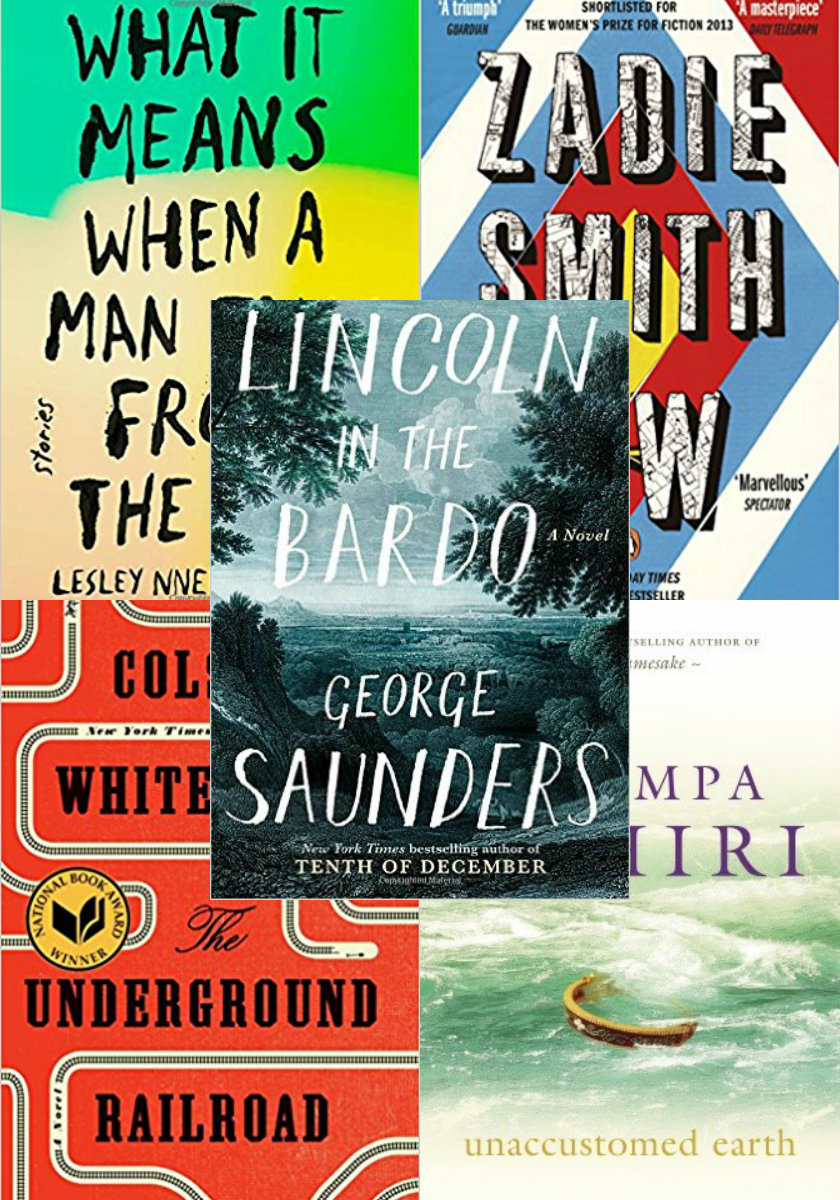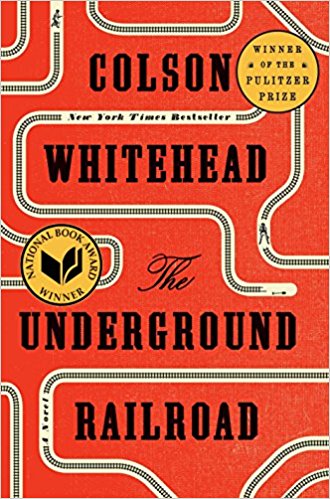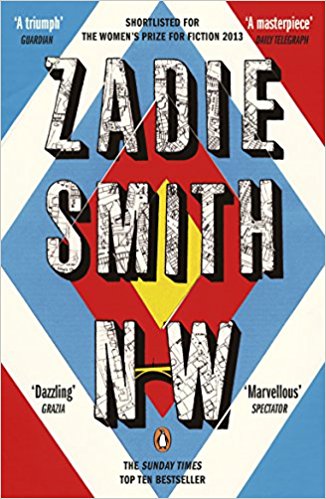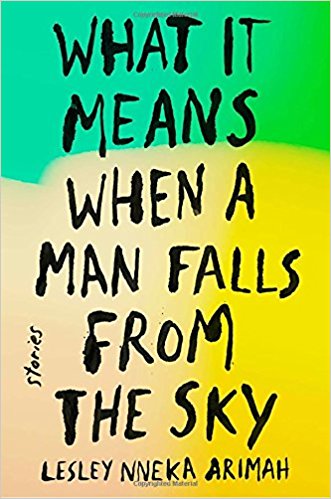
August-September Fiction Roundup! After a slow start and detour into Hillary Clinton land, I wound up finishing five works of fiction. The Underground Railroad (3.5/5), Unaccustomed Earth (4/5), NW (5/5), What it Means When a Man Falls from the Sky (4.5/5), Lincoln in the Bardo (5/5). Maybe I was just in a hyperbolic mood this past two months, but I really dug this mix.

There are books you respect, and books you love. The winner of this year’s Pulitzer Prize, The Underground Railroad (3.5/5) is a book I respected in the present, and am increasingly warming to in hindsight. I’ve started to think of reading a bit like drinking beer: you start with the basics (Bud and Guinness), fall for the extremes (the IIIPA, the 20% imperial stout, the sour so bretty it’ll burn off your tongue), but eventually — if you get far enough into it — crave something harder to define. Subtlety. The perfectly balanced pilsner. The pale ale that didn’t even want to impress you. Fictionwise I’m still somewhere up in 15% ABV territory; I still want to be obviously dazzled by the perfect phrase or feat of lyrical dexterity. This book is a perfectly balanced wonder — a sort of 19th century Gulliver’s Travels following a formerly enslaved woman as she journeys through the American South to escape her captors, with each stop on the (literal) railroad functioning as its own mini-allegory. It’s elegant, moving, and endlessly creative; extraordinarily heavy without toppling under its weight, wise without feeling overtly didactic. But it never set out to dazzle, and that (intentional) unshowiness often left me feeling like I was missing some grander point. A brilliant central metaphor and some truly wonderful passages make for a great read, but the pieces never quite connected for me.
“Looking down over the universe of the park, she saw the town drift where it wanted, washed by sunlight on a stone bench, cooled in the shadows of the hanging tree. But they were prisoners like she was, shackled to fear. Martin and Ethel were terrified of the watchful eyes behind every darkened window. The town huddled together on Friday nights in the hope their numbers warded off the things in the dark: the rising black tribe; the enemy who concocts accusations; the child who undertakes a magnificent revenge for a scolding and brings the house down around them.”

OK, so that beer analogy was a lie. Because if there’s one thing Jhumpa Lahiri is not, it’s extreme. Her writing is almost defiantly non-urgent: it employs few rhetorical flares and rarely draws attention to itself. It’s slow, nourishing, and radiating with softness; like reading the private diary of a friend you’ve known your whole life but somehow forgotten. There isn’t much to say about Unaccustomed Earth (4/5) that I didn’t already say about Interpreter of Maladies, because I’m not entirely sure where one ends and the other begins. It follows similar characters (Bengali immigrants) in similar contexts (New England, usually Cambridge Square) facing similar life decisions (meshing their history with their past; finding truth in their marriage; reconciling with overbearing parents). There’s a method to it, if not exactly a formula — and I can’t get enough of it. So, so good.
“And yet he felt justified. Wasn’t it since Monika’s birth that so much of his and Megan’s energy was devoted not to doing things together but devising ways so that each could have some time alone, she taking the girls so that he could go running in the park on her days off, or vice versa, so that she could browse in a bookstore or get her nails done? And wasn’t it terrible, how much he looked forward to those moments, so much so that sometimes even a ride by himself on the subway was the best part of the day?”
“Now she was free of both of them, free of her past and free of her future in a place where so many different times stood cheek by jowl like guests at a crowded party.”

NW (5/5) will certainly have its share of haters. I am not among them. Zadie Smith is possibly the most brilliant punch in the face you will read. Her use of language is addictive, steering through tense and voice with the confidence of a lifelong London cabbie who knows all the best routes and trust me, yes it does say One Way and I suppose that was a median but, trust me, we’re getting somewhere. White Teeth showcased her skill with ferocity, but it came with its share of first-novel baggage: outlandish characters, oversized plot points, dialogue which bordered on caricature. Here Smith goes inward, following the stream-of-consciousness thought life of three Londonites…and that’s…basically it. Tonally it veers between dark humor and poignance, mockery and empathy, often within a single sentence. Can I recall exactly what happened, or what the thesis was? Can I find the perfect quote to justify why I devoured the entire book over two consecutive flights when I should have been sleeping? Do I have any reason to think you won’t get 3 pages in, find it to be self-indulgent nonsense, and wonder what I’ve been smoking? I can’t and don’t. This is a IIIPA brewed in habanero peppers and also, somehow, a warm cup of sleepy-time tea. I loved it.
“The train pulls in and Leah watches Pauline regard it calmly, step forward to the yellow line. This realm of Pauline’s—the realm of the so sad—is immutable and inevitable, like hurricanes and tsunamis. No particular angst is attached to it. Normally, this is bearable; today it is obscene. So sad is too distant from Pauline’s existence, which is only disappointing. It makes disappointing look like a blessing. This must be why news of it is always so welcome, so satisfying.”
“The cap, the hooded top, the low jeans, it’s a uniform—they look the same. From where Leah stands anyway it is still all dumb show, hand gestures and primal frowns, and of course some awful potential news story that explains everything except the misery and the particulars: one youth knifed another youth, on Kilburn High Road. They had names and ages and it’s terribly sad, an indictment of something or another and also not good for house prices.”

Completing the trilogy of female-authors-of-color-who-write-primarily-about-immigrants-and-whose-debut-works-were-so-friggin-good-they-made-me-angry: Lesley Nneka Arimah’s What It Means When a Man Falls from the Sky (4.5/5). I’m sure I live in a bubble, but I honestly have no idea who this short story collection wouldn’t appeal to: Arimah has heart like Lahiri, pizazz like Smith, and the wild creativity of Kelly Link. Her Nigeria functions like Junot Diaz’ Dominican Republic: a chaotic undercurrent which propels every story but never condescends you with a Wikipedia history lesson. She’s quotable, confident, and always writes with purpose. She also has one quality virtually no author has the first time around: the sense to know exactly when to stop. This is a dazzling, concise collection. You should read it. Whoever you are, you’ll probably like it.
“Ezinma fumbles the keys against the lock and doesn’t see what came behind her: Her father as a boy when he was still tender, vying for his mother’s affection. Her grandmother, overworked to the bone by the women whose houses she dusted, whose laundry she washed, whose children’s asses she scrubbed clean; overworked by the bones of a husband who wanted many sons and the men she entertained to give them to him, sees her son to his thirteenth year with the perfunction of a nurse and dies in her bed with a long, weary sigh.”
“It was the new mother’s face. The child was as plain as pap, but the mother’s face was full of wonder. One would think the baby had been spun from silk. One would think the baby was speckled with diamonds. One would think the baby was loved. Mother cradled mother, who cradled child, a tangle of ordinary limbs of ordinary women.”

My first introduction to George Saunders, and boy what a doozy. I truly didn’t know how to approach Lincoln in the Bardo (5/5). I started with the Audible production, whose all-star cast (Nick Offerman, David Sedaris, Megan Mullally, Ben Stiller, Julianne Moore, Jeff Tambor, and literally 159 more) caught my eye. 8 minutes in and I gave up. It was total cacophony, and it didn’t make a lick of sense. The next day I came back at it with my Kindle, and…it still didn’t make sense. It sat there for a few days, taunting me, till I reluctantly came back for a third (and final) attempt. That time it clicked. I dove back into the cast recording, zig-zagged between audio and text, and devoured it two or three times in one go — re-listening to whatever I’d only read, re-reading whatever I’d only heard, and repeating both whenever I felt particularly floored. Which, apparently, I felt a lot.
This is a difficult book to explain. It’s takes place toward the beginning of the Civil War, as Abraham Lincoln’s son Willie is dying of typhoid fever. Most early chapters consist entirely of quotes: snippets of eye-witness accounts of the same moment in Lincoln’s life, many from real sources but some almost certainly invented by Saunders (though it never tells you which is which). It reads less like a novel than a piece of anthological found art. Then young Willie dies, and we hear a different set of voices: a chorus of ghosts, speaking over one another, recounting their interactions with him in the afterlife in the same documentary style. The format is as chaotic as you’d expect, and it never relents. Soon you don’t want it to. A traditional narrative — very Pilgrim’s Progress or Great Divorce, but also, nothing like those things — somehow develops in that dreamscape, as fact and fiction bounce off of each other. It’s gorgeous, absurdly inventive, witty, sentimental, difficult, profound, silly, sad. It’s a deeply personal account of grief (both from the eyes of the griever — Abraham — and the eyes of the grieved — Willie and his hundred-plus companions who refuse to move on). It’s also an historical account of the contradictions of the civil war, a sweeping parable about life and death, and roughly 163 other things (including, but not limited to: a satire of said parables, a mockumentary?, Our Town, science fiction, a ton of Wendell Berry). I can’t fathom what kind of mad genius could conceive of all this, and I can’t praise it enough.
“Mr. Vollman turned to me, smiling in a pained but kindly way. None of that ever was, he said. And it never will be. Then he drew a deep breath. And stepped into the burning train.”
“Everything nonsense now. Those mourners came up. Hands extended. Sons intact. Wearing on their faces enforced sadness-masks to hide any sign of their happiness, which—which went on. They could not hide how alive they yet were with it, with their happiness at the potential of their still-living sons. Until lately I was one of them. Strolling whistling through the slaughterhouse, averting my eyes from the carnage, able to laugh and dream and hope because it had not yet happened to me. To us.”
“I was in error when I saw him as fixed and stable and thought I would have him forever. He was never fixed, nor stable, but always just a passing, temporary energy-burst. I had reason to know this. Had he not looked this way at birth, that way at four, another way at seven, been made entirely anew at nine? He had never stayed the same, even instant to instant. He came out of nothingness, took form, was loved, was always bound to return to nothingness. Only I did not think it would be so soon. Or that he would precede us. Two passing temporarinesses developed feelings for one another. Two puffs of smoke became mutually fond.”